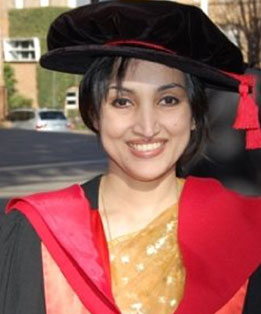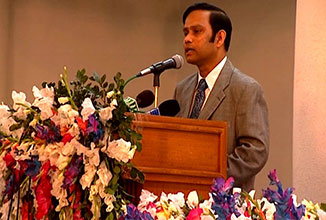
Dr. Nirupoma Rahman
Educator and researcher from the University of Melbourne
Dr Nira (Nirupoma) Rahman is a passionate vocalist and musician while she is an academic working around educational design and student engagement in higher education by profession. She proudly practices the principles of the Agra Gharana’s music and regularly performs Classical, Semiclassical and Bangla Music (especially Nazrul, Tagore and Raagpradhan songs). Her music is enthused by her passion for literature and culture; inspired by the gurus she has enjoyed the tutelage of from a very young age and stimulated by her academic work around language, culture and representation of identity.
Nira started learning Indian (Hindustani) classical music at the age of three, even before going to school, from Smt. Swapna Roy and then from Sri Krishnakantha Acharjya. At the age of six, she was very fortunate to be inducted into the Agra Gharana by Pandit Barin Mazumder (a disciple of Ustad Faiyaz Khan). At the same time, she spent many years learning Bengali music (Tagore Songs in particular) with Tagore musicologist Wahidul Haque.
After finishing her secondary schooling, Nira received an Indian Council for Cultural Relationship (ICCR) Scholarship to study English Literature at Jadavpur University, Kolkata. It is there that she transferred to the tutelage of Vidushi Dipali Nag (a disciple of Ustad Faiyaz Khan and the then Director of Sangeet Research Academy, India), with whom Nira developed her passion and craft of Indian classical and semiclassical music like Kheyal, Thumri, Kajri and Bangla Raagpradhan songs.
Dr Nira Rahman defines her music as her prayer, for her music is the way of expressing her sense of self. Her music helps her to represent her passion and emotion while it connects her physical and spiritual worlds. This raw love and emotion behind her music has allowed her to continue developing her craft. She often says that the uniqueness of her music comes from the beauty of Bengali history, culture and literature, connected with the immense musicality of Indian classical music. She credits this uniqueness to the powerful influence that Dipali Nag and Wahidul Haque had over her music.
Alongside her passion for music, Dr Nira Rahman has continued to pursue a career as an academic through her life. After completing her BA with an Honours degree in English Literature from Jadavpur University, she completed her MA in Applied Linguistics from the University of Dhaka, and then another Masters Degree from Monash University, Australia. She attained her PhD in the field of Sociolinguistics and Education from the University of Melbourne, Australia.
Currently Dr Rahman works in the Arts Teaching Innovation in the Faculty of Arts, University of Melbourne. Her works are focused towards a more inclusive, applicable, transformative and internationalized Arts and Humanities Education. Her specific interests lie in co-creation in higher education; student voice and agency; student employability and articulating transferable Humanities and Arts skills; intercultural communication and competencies in inclusive diverse classrooms.
Dr Rahman’s passion for her work in education, music and community inspires her to find ways to start and continue the robust discussion around the various diverse and intersectional identities present within the community and how that can be more inclusive. She also regularly writes for Australian and Bangladeshi (in both English and Bangla) media on various topics that connect her academic interests to her personal insights around culture, language and identity.












